Worm bins out of wood: Avoiding plastic
hoorayfororganic
12 years ago
Featured Answer
Sort by:Oldest
Comments (15)
druid180
12 years agoRelated Discussions
? How to avoid heating in worm bin ?
Comments (4)When heating occurs in a home bin you can just about count on the fact that it is pocket fed. Heat requires mass and some insulation, both of which are better supplied by massing food in one spot down in the bedding than when food is spread in a thin layer over the surface of the bin contents then covered with an equally thin layer of new bedding, as is done in top-feeding. If heating is a regular problem for you then consider the top-feeding method. As for cocoons, these little structures and the developing young inside are barely impacted by the heating in a large backyard compost pile, let alone the lower heat achieved in a low-mass worm bin. Cocoons can survive drying; heating (to temps in excess of 115 degrees F); long-term submergence (more than two years); freezing for extended periods; and ingestion by animals, even ruminant animals, like cows and goats (provided they make it past the teeth). In response to stressful conditions outside the young within the cocoon slow development, completing developmnent when exposed to conditions more favorable to worm activity. You can feel confidently that the heat in your bins has had no measurable impact on your cocoons. Kelly S...See MoreOutside Worm Bins and Native Worms
Comments (20)wfike, are you adding wood shavings to improve the texture of the casts or to help aerate the bedding? I've read, and surmise, that wood shavings take a long time to break down, so I'm assuming you aren't adding them as feedstock, am I figuring this correctly? I've also read, from several older vermi books (and the Vermiculture_FarmersManual), that horse manure by itself is not the best feed, but that cattle manure is good. Do you mix the 2 as feedstock and bedding? I guess what I'm trying to understand is whether you use horse manure as feedstock and feel it is an adequate feed by itself. I added soaked, torn corrugated cardboard to the horse manure because I'd read that it has excellent nutrition due to the high-protein glue that is used to hold the layers together. Another advantage that corrugated cb has is it's water absorbancy, so the 2 (horse manure and corrugated cb) mixed together make a good bedding and a good feedstock. But, you know, you can find all sorts of contradictions when comparing books, websites, and opinions...so I'm interested in what you find to be true, based on your experience. Cheryl, I have been freezing the food waste lately. It does seem to speed things up a bit, but there is still the issue of varying amounts of water being released, mold/fungus, and odors if you use too much or have strong smelling foods to vermicompost. I've found that as much as I want to keep food waste from the landfills, it's a lot of aggravation (too much water, mold, fruit flies, fungus gnats, march flies, houseflies, odors..etc), inconvenience (both of my freezers are half full of food waste for the worms, leaving only half for my own food), and guess-work involved in feeding food waste to the worms. Now, if I didn't have access to horse manure and corrugated cardboard, I would still use primarily food waste. But since I do have access to those materials, I much prefer using them. I have encountered very few issues/problems using horse manure and corrugated cb. So, I ease my conscious by reminding myself that these 2 items would have been dumped in a landfill somewhere, had I not taken them. I still plan on freezing some food waste to use as trench feedings in my raised beds. This practice has eliminated all issues/problems with using food waste because it is buried 4-6" under the soil, and I have many worms in my raised beds who process this food quickly (and thank me for the cold stuff when it's hot outside). The junk mail I use are advertisements for credit cards, various insurance, and a hodgepodge of solicitations. I just remove them from the envelope and tear into strips that could be used as bedding (I put them in the compost crate, so they will be partially composted by the time the worms get to it). I don't use glossy papers, not because they are bad for the worms, but because they take forever to break down and I don't like the look of them in the compost. The Vermiculture FarmersManual recommends shredding cardboard that has a waxed coating, so I assume wax is safe to use if shredded or had the wax seal broken in some other fashion . I've read that oils are not good for worms (I assume oil would smother them since they breath thru their skin), but I wouldn't think a small amount would be harmful. The boxes that you have should be fine. Most of the corrugated cardboard that I use has colored printing on it and I haven't noticed any problems with it (the majority of people say that most inks are soy based now). I also use shredded office paper in the indoor bin I just created, and to absorb water from the barrel bins outside when rain has been heavy, and that paper has been thru laser printers. I haven't seen any ill effects from any of the paper products I have used. Welcome to the thread, Cheryl. I look forward to reading about your experiences in the vermi-world....See MoreStarting out with a worm bin
Comments (4)I don't think it matters much. The Can O Worms I just got says to put the cardboard it came wrapped in on the bottom of the tray to prevent bedding from falling through although I don't think it would fall through anyway. On top of that it says to put the coir it came with, but one can use peat, leaves, newspapers, whatever 'brown' fibery type material one wants. The food goes on top of the bedding and then the worms will hang out in the bedding while they do their thing. A damp newspaper is placed over the top of the worms:food:bedding according to the instructions. Anyway, before too long the worms take everything in the bin and turn it into poop and they then live in that so... they don't seem too particular ;-)...See MoreIs there a market for another worm bin?
Comments (40)Further off topic for advertising I would also estimate how long the limited life expectancy of a cloth worm bin will last compared to your sturdy system. 3 years vs 30 years? Horribly off topic. Do you really believe the breathable cloth material does what it says it does? It is used in high end sports clothes. They advertize it is rain proof yet lets persperation vent. ??? All the labels say this. All the salesmen say this. Everybody belives this. Apparently the material does this. I must be from Missouri because I just don't believe it. Yet the worms seem to. It seems like a great system yet it does not meet my needs of build it and forget it (except for harvesting great vermicastings) for 100 years. I love the worm inn idea, it is genius. I want a flow through system not of cloth, but still of genius. So another worm bin is of interest. Until then I will putter around with my various buckets and pails. And have a great time doing so. Maybe I don't want a new well working system. That would take all my fun away....See Morehoorayfororganic
12 years agomendopete
12 years agohoorayfororganic
12 years agoequinoxequinox
12 years agovermiprano
12 years agovermiprano
12 years agomendopete
12 years agovermiprano
12 years agocolin3
12 years agohoorayfororganic
12 years agohoorayfororganic
12 years agoJoeWeil
9 years agorenais1
9 years ago
Related Stories

GARDENING GUIDESHouzz TV: Make a Worm Bin for Rich Soil and Happy Plants
A worm-powered compost bin that can fit under a sink turns food scraps into a powerful amendment for your garden. Here’s how to make one
Full Story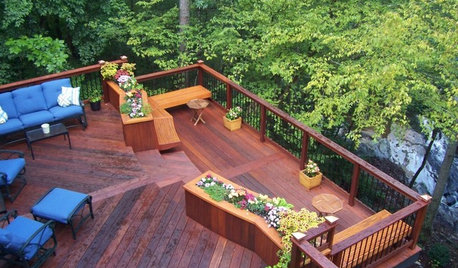
GARDENING AND LANDSCAPINGChoosing a Deck: Plastic or Wood?
Get the pros and cons of wood, plastic, composite and more decking materials, plus a basic price comparison
Full Story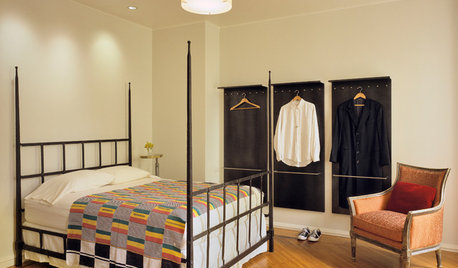
STORAGE9 Ways to Avoid a ‘Floordrobe’ in Your Bedroom
Repeat after me: The floor isn’t storage space for clothes! Tackle the ‘floordrobe’ effect with these smart tips
Full Story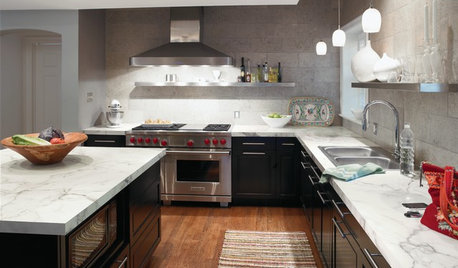
KITCHEN COUNTERTOPSKitchen Counters: Plastic Laminate Offers Options Aplenty
Whatever color or pattern your heart desires, this popular countertop material probably comes in it
Full Story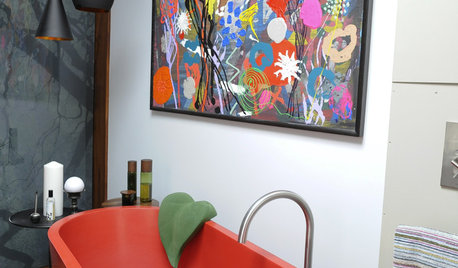
MATERIALSA Hard Look at Recycled Plastic for the Home
It's durable and versatile, but processing takes a lot of energy. We sort through the facts on recycled plastic so you can choose wisely
Full Story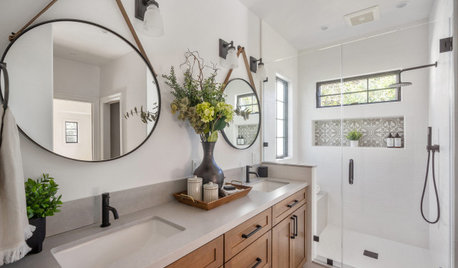
BATHROOM DESIGN5 Common Bathroom Design Mistakes to Avoid
Get your bath right for the long haul by dodging these blunders in toilet placement, shower type and more
Full Story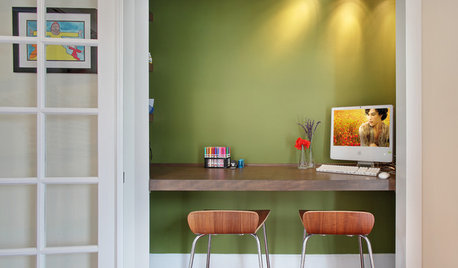
ORGANIZINGAvoid the Great Paper Pileup
Don't let unavoidable scraps cause a jam in your paperless system. These easy tips will keep your home office lanes clear
Full Story
PETS5 Finishes Pets and Kids Can’t Destroy — and 5 to Avoid
Save your sanity and your decorating budget by choosing materials and surfaces that can stand up to abuse
Full Story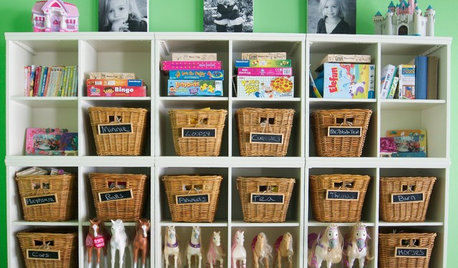
DECLUTTERINGTame the Toy Chaos: Bin Storage for All
New project for a new year: With bins, totes and shelves, a clutter-free playroom can be yours
Full Story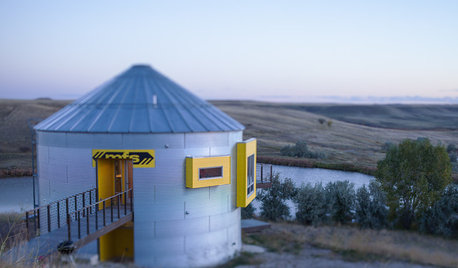
HOUZZ TOURSHouzz Tour: Prairie Grain Bin Turned Bucolic Retirement Home
An agrarian structure and a big dream combine in this one-of-a-kind home that celebrates 250 acres of Montana grasslands
Full StorySponsored



hoorayfororganicOriginal Author